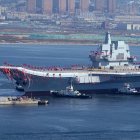US to send anti-ship systems to Philippines to deter China
Secretary Pete Hegseth pledged to strengthen ties with partners in the region to counter Chinese influence: "The broader our alliance, the better."

Pete Hegseth with Philippine President Ferdinand Marcos Jr.
Although China is not on the itinerary, Defense Secretary Pete Hegseth's first Asian tour is intended to send a special message to Beijing: the United States is watching its Indo-Pacific maneuvers.
"We do not seek war, we seek peace, but those who long for peace must prepare for war," Hegseth said Friday from Manila, Philippines. "We stand united, shoulder to shoulder," he said of the US-Philippine alliance, which he traced back to World War II. An "ironclad alliance," "particularly in the face of communist China's aggression in the region."
Out of the talks came plans to bolster Philippine military capabilities, including through the delivery of new US technologies. Most notable: the deployment of Navy and Marine Expeditionary Ship Interdiction Systems (Nmesis), which allows missiles to be launched from shore at vessels in mid-ship.
Despite an international ruling to the contrary, the Communist Party of China (PPCh) considers the South China Sea its own. Manila, which claims a portion, officially designating it the West Philippine Sea, has been the object of increasing pressure from Chinese vessels.
Nmesis technology would serve as "deterrence" against such maneuvers, one of the three pillars repeated by the secretary since his inauguration (along with "restoring the warrior ethos" and "rebuilding the military"). Also the announcement of plans to develop joint exercises and strengthen military-industrial collaboration.
"The broader our alliance, the better"
Hegseth will end his trip in Japan. But he looks further afield to Australia, South Korea and "other nations in this part of the world" that will work with Washington to establish "the deterrence necessary to prevent war."
"The broader our alliance, the better," he assured. "The more security cooperation, the better." The secretary assured that the goal is for China to encounter "more strategic dilemmas" when it decides to act.
His tour and alliances, the Fox anchor said, are part of a "shift" in the White House's priorities, which will "prioritize" the region. A message to Beijing.



























